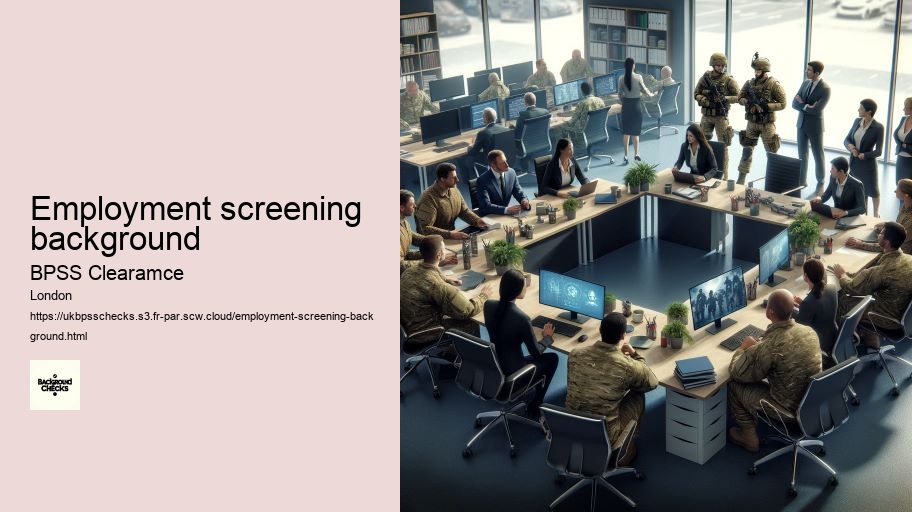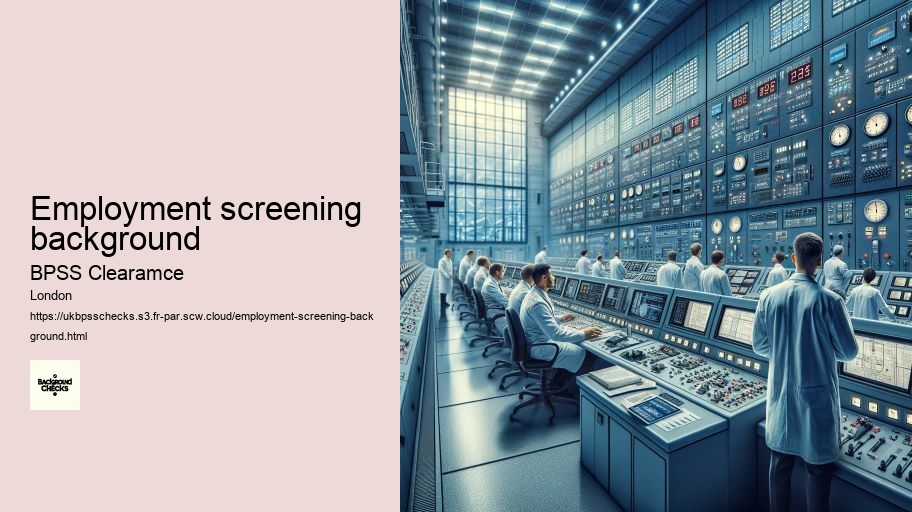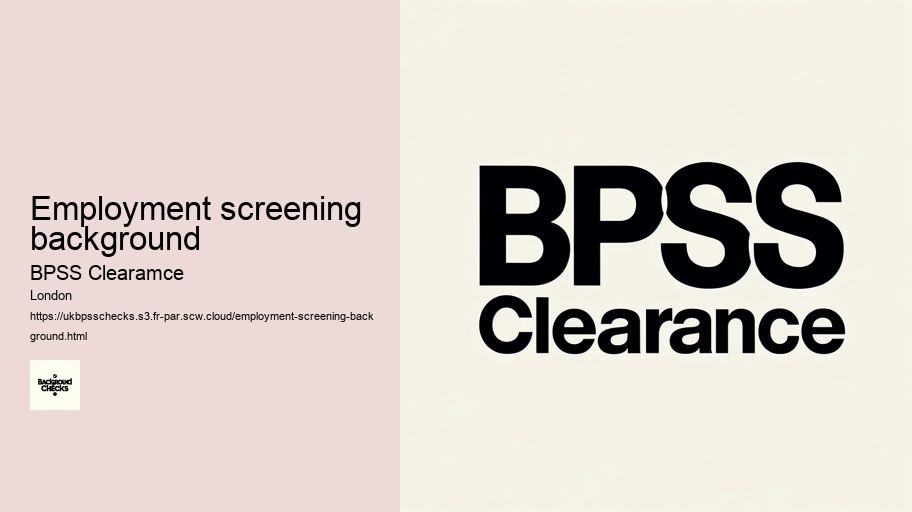
In contrast, DBS checks might need to be renewed more frequently, especially for positions involving regular contact with vulnerable groups. Some organizations require a new DBS check every three years or have policies for more frequent updates, reflecting the ongoing need to protect vulnerable populations.
What Is the Difference Between Bpss and Dbs? When distinguishing between BPSS and DBS checks, it's vital to recognize that BPSS focuses on national security vetting, identity verification, and right to work status, while DBS solely examines an individual's criminal record.
Coordinating with overseas authorities for document verification and background checks adds another layer of difficulty, extending the time required for completion. Addressing inconsistencies or gaps in the information provided by the individual undergoing BPSS clearance may necessitate additional time and effort to resolve.
The BPSS clearance process also assesses the nationality and immigration status of the applicant, confirming their eligibility to work in the UK.
In summary, while BPSS checks provide a security baseline for individuals primarily working within or for the UK government, DBS checks serve to protect vulnerable groups from potential harm. Both types of checks are crucial, yet they serve different and complementary purposes within the spectrum of employment background screenings in the UK. Organizations must understand the differences to ensure they are implementing the correct type of check for their specific needs.
Adhere to the Baseline Personnel Security Standard (BPSS) clearance process to gain authorized access to UK OFFICIAL Assets. To guarantee you meet the necessary requirements for accessing these assets, consider the following:

The application of digital tools in the BPSS process also brings about challenges, particularly concerning data protection and privacy. The use of digital platforms increases the risk of data breaches if not properly secured. Thus, it is imperative that organizations implementing digital BPSS processes adhere strictly to data protection laws and employ robust cybersecurity measures.
The scope and depth of the checks under these two standards vary significantly. BPSS checks serve as a preliminary screen to establish a baseline of trust and integrity, typically including right to work verification, criminal record checks, verification of identity, and an employment history check.
BPSS clearance is crucial for government administrative officers who handle confidential documents and make decisions impacting national policies. Ensuring they handle sensitive information responsibly mandates thorough background checking through BPSS.
The use of digital platforms in the BPSS process facilitates better communication and document management. Candidates can upload necessary documents directly through secure online portals, which are immediately accessible to HR departments and vetting personnel. This eliminates the delays associated with physical mailing and reduces the risk of documents being lost or mishandled.
Baseline Personnel Security Standard (BPSS) checks and BS7858:2019 checks are both integral to pre-employment vetting in the UK, but they serve different purposes and are structured to meet the needs of different sectors. BPSS is the standard background check required primarily for government employees and contractors to ensure they meet certain standards of trustworthiness and reliability. In contrast, BS7858:2019 is a specific British Standard providing detailed guidelines for the screening of individuals working in secure environments, often within the private sector, such as security and alarm system services.
Checking criminal records focuses on unspent convictions, evaluating an individual's trustworthiness. Confirming employment history validates the accuracy and truthfulness of the past three years of work or activity.


Who Needs a BPSS Check, Confirming the need for a BPSS check involves identifying specific roles and sectors where clearance is mandatory to safeguard sensitive information and establish trustworthiness.
Identity verification is a fundamental step in the BPSS clearance process, as it validates your eligibility to access sensitive UK assets. The accuracy and authenticity of the documents you submit play a significant role in the successful completion of your BPSS clearance.
In conclusion, digital technology has profoundly impacted the BPSS process by making it faster, more accurate, and more secure. However, it also necessitates stringent measures to guard against potential cybersecurity risks. As technology evolves, it will continue to shape how Baseline Personnel Security Standard checks are conducted, promising even greater improvements in efficiency and security in the future.
The timeline for conducting these checks also differs. BPSS checks are generally quicker to complete, often within a few weeks, reflecting their role as a baseline security measure. BS7858:2019 checks, due to their more detailed nature, can take significantly longer — up to 12 weeks or more — as they require gathering more comprehensive information and thorough verification processes from multiple sources.
BPSS is essential for roles accessing sensitive government assets, whereas DBS is commonly used in sectors like healthcare and education. Employers often require both checks to thoroughly screen candidates, ensuring safety and trust in their workforce.
Key components of BPSS clearance encompass verifying the right to work, conducting identity checks, checking criminal records, and confirming employment history. Ensuring the right to work involves validating an individual's legal status to be employed in the country. Identity checks are essential, requiring verification through official documents to confirm personal details.

Procurement officers in government departments handle large-scale purchases and contracts that can have significant financial implications. BPSS clearance is essential to prevent corruption and ensure these roles are filled by individuals who are beyond reproach.
The right to work check under BPSS serves as a legal safeguard that prevents illegal employment. In the UK, it's mandatory for employers to ensure that their employees have the legal right to work before commencing employment. Failure to verify this can lead to severe penalties, fines, and reputational damage for the organization if they are found to be employing someone illegally.
To guarantee your suitability for BPSS clearance, gather the necessary verification documents, including proof of right to work in the UK and identity verification papers such as a passport or driver's license. These documents are essential for confirming your eligibility and identity during the clearance process.
BPSS stands for "Baseline Personnel Security Standard." It's essentially a basic level of security clearance required for individuals working in roles that involve access to sensitive information or facilities, especially in the public sector. The BPSS checks typically include identity verification, employment history checks, and criminal record checks.
No, BPSS (Baseline Personnel Security Standard) and DBS (Disclosure and Barring Service) are not the same.
BPSS (Baseline Personnel Security Standard): This is a set of government guidelines in the United Kingdom for ensuring the security clearance of individuals working with sensitive information or in certain roles. It is a basic level of security clearance and involves checks such as identity verification, employment history, and criminal record checks. BPSS is often required for roles in both the public and private sectors where access to sensitive information or facilities is involved.
DBS (Disclosure and Barring Service): This is a government agency in the UK that performs checks on individuals working with children or vulnerable adults. The DBS conducts criminal record checks (previously known as CRB checks) to help organizations make safer recruitment decisions by identifying candidates who may be unsuitable for certain roles due to past criminal convictions, cautions, reprimands, or warnings.
While both BPSS and DBS involve background checks, they serve different purposes and are used in different contexts. BPSS focuses on security clearance for a broader range of roles, including those involving access to sensitive information, while DBS specifically focuses on roles involving work with vulnerable groups.
The Baseline Personnel Security Standard (BPSS) checks typically include:
Identity Verification: Verifying the identity of the individual through official documents such as passports, driver's licenses, or other government-issued identification.
Employment History Checks: Verifying the individual's employment history to ensure accuracy and assess their suitability for the role.
Criminal Record Checks: Checking for any criminal convictions or cautions. This is often done through a Basic Disclosure from the Disclosure and Barring Service (DBS) in England and Wales, Disclosure Scotland in Scotland, or AccessNI in Northern Ireland.
Verification of Address: Verifying the individual's current and previous addresses to ensure accuracy and completeness of their background information.
These checks are aimed at establishing a baseline level of trustworthiness and suitability for individuals working in roles that require access to sensitive information or facilities, particularly within the public sector but also in some private sector positions.
A valid proof of address for a Baseline Personnel Security Standard (BPSS) check typically includes official documents that clearly display the individual's name and current address. Common examples of acceptable proof of address documents may include:
Utility Bills: Recent bills for services such as electricity, gas, water, or landline phone, issued within the last three to six months.
Bank Statements: Recent bank statements, typically issued within the last three to six months, showing the individual's name and address.
Official Letters: Letters from government agencies, local authorities, or financial institutions, such as tax statements, council tax bills, or letters from the Department for Work and Pensions (DWP), which display the individual's name and address.
Tenancy Agreements: A signed and dated rental or lease agreement for accommodation, showing both the tenant's and landlord's details, along with the property address.
Mortgage Statements: Statements from a mortgage provider showing the individual's name and property address, issued within the last three to six months.
It's important to note that the specific requirements for proof of address may vary depending on the organization conducting the BPSS check. Additionally, the document should be recent and not expired, and it should clearly display both the individual's name and current address.
A Baseline Personnel Security Standard (BPSS) check is typically required for individuals working in roles that involve access to sensitive information or facilities, particularly within the public sector but also in some private sector positions. While specific requirements may vary depending on the organization and the nature of the role, BPSS checks are commonly needed for individuals who:
In summary, individuals who require a BPSS check are those whose roles involve a level of trust, responsibility, and access to information or facilities that necessitate verification of their identity, employment history, and suitability for the position.
The Baseline Personnel Security Standard (BPSS) does not have an expiry date like some other security clearances. Instead, it serves as a foundational level of security clearance that establishes an individual's baseline trustworthiness and suitability for roles requiring access to sensitive information or facilities.
However, while the BPSS itself does not expire, organizations may have their own policies regarding the periodic review or renewal of security clearances for their employees. For instance, some employers may require employees to undergo regular rechecks or refreshes of their background checks, including BPSS checks, to ensure that their security clearance remains up to date.
Therefore, although the BPSS clearance itself doesn't have a fixed duration, individuals and organizations should be aware of any policies or requirements related to maintaining and updating security clearances in accordance with best practices and organizational guidelines.